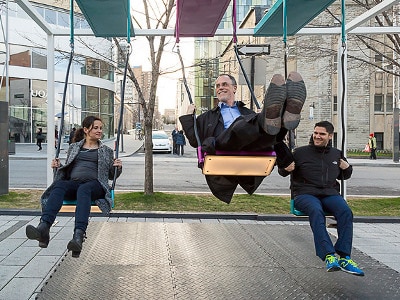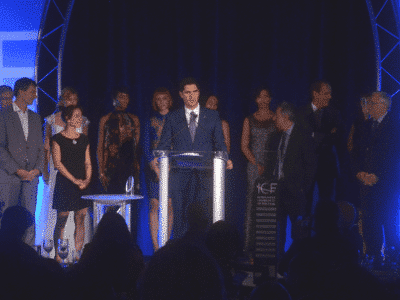

Intelligent Communities Forum co-founder Robert Bell was in Montreal recently, taking a whirlwind tour of the city’s Smart City infrastructure and getting a glimpse of how Montreal uses technology in its own way, with an emphasis on culture, joie de vivre, and the challenges of snow removal.
Montreal is one of three Canadian cities still in the top seven finalists for the ICF 2016 Intelligent Community of the Year award, the other two being Winnipeg and Surrey, B.C.
Bell’s tour of Montreal saw him visiting the control room for the city’s downtown Quartier des spectacles infrastructure, and playing on the area’s outdoor swingset art installation along with its creator Mouna Andraos and vice president of the executive committee responsible for information technologies and the smart city, Harout Chitilian.
Stopping in for a visit at Notman House, Sylvain Carle, General Director of Founder Fuel and Real Ventures Partner, explained the unique nature of the Montreal’s tech ecosytem.
“Other ecosystems, like Waterloo, are sort of centralized, where everything happens at Communitech,” said Carle, “Montreal is more a patchwork. We have this network of different hubs in the ecosystem.”
Real Ventures, a seed stage venture capital company, has invested in more than 150 companies since its founding in 2007, including Frank & Oak, VarageSale and Blockstream.
Although Notman House acts as an anchoring point for the city’s tech ecosystem, entrepreneur development is held together by solid links between organizations such as Founder Fuel and Concordia University’s start-up innovation centre District 3, smart city incubator InnoCité, Hacking Health, and game accelerator Execution Labs, among others.
For Carle, the start-up ecosystem is very much like the independent music scene. “For me, start-ups are independent businesses. The same spirit of DIY, do-it-yourself, start your own record label, start your own fund, it’s the same story. So I think it was in the air.”
But as Harout Chitilian pointed out, “Let’s not forget, we also had the strong presence of all the telecommunications companies. We had Nortel, we had Ericsson. We have a lot of built-up know-how and when these things went bust, all these guys were available.”
This is not even to mention Bixi, the bike-sharing service which began life in Montreal, and has since been exported to New York, London, Toronto and Melbourne, Australia among others, an example of a city proactively working to improve citizen quality of life through modular infrastructure.
Chatting with Cantech Letter about the other two ICF finalists, Bell points to Surrey’s heritage as a mix of suburbs and small urban centres, with the city’s plan centering on their Innovation Boulevard initiative, anchored at one end by Simon Fraser University and at the other by Surrey Memorial Hospital.
______________________________________________________________________________________________________________________________

This article is brought to you by Nano One (TSXV:NNO). Nano One is changing how nanomaterials are made for batteries and other billion dollar markets. Click here to learn more
____________________________________________________________________________________________________________________________
In Winnipeg, Bell singles out the city’s education system.
“They’ve got this incredible high school, Sisler High School, that’s got a cybersecurity program, which wins awards from the U.S. Air Force CyberPatriot Games every year for high school and college students,” he says. “These kids have gone three years in a row and walked out with the top prize. There’s no other high school in the world that’s done that that I’m aware of. They’ve got a sophisticated program. The province threw in almost a quarter of a million dollars to build them a system whereby they can simulate a complete corporate network. So the kids have these high-level skills. It goes from that level all the way up to the universities.”
Bell also took a tour of Manitoba Telecom’s data centre and praised its culture of innovation.
Winnipeg, incidentally, has also become host to Canadian Tire’s Cloud Nine Computing Centre, a $50 million, 28,000 square foot facility digital hub serving Canadian Tire’s 1,700 locations across Canada, with an App Factory, a gamification lab and a team of behavioural scientists, which opened in February 2014.
“One of our principles is called the Innovation Triangle,” says Bell. “You get business, you get government, you get institutions working together, which is very hard, by the way. But when you do that, the economic growth that happens tends to stay local, as opposed to delivering the benefits to shareholders someplace else.”
What’s clear is that over the past decade, innovation is driven more at the municipal level than at the larger provincial/state or federal levels of government, with cities fostering their own particular culture of innovation to designed to attract knowledge workers and high-value industrial partners while also retaining each city’s individual character.
“We think that cities are the most exciting laboratories around, because this is where innovation takes place that touches people’s lives,” says Bell. “In all the communities we deal with, the city government is incredibly conscious of the idea that they need business success, and that the things that businesses and educational institutions are doing need to flow right through the lives of citizens. Otherwise, they’re not doing their job.”
The winner of the 2016 Intelligent Community of the Year award will be announced in Columbus, Ohio in June 2016.
Comment
One thought on “Montreal, Winnipeg and Surrey in running for international Intelligent Community award”
Leave a Reply
You must be logged in to post a comment.





 Share
Share Tweet
Tweet Share
Share




In Montreal, you forgot to mention Founder Institute in Montreal, as well as McGill Accelerator, ETS Centech Incubator, and HEC Accelerator… among others